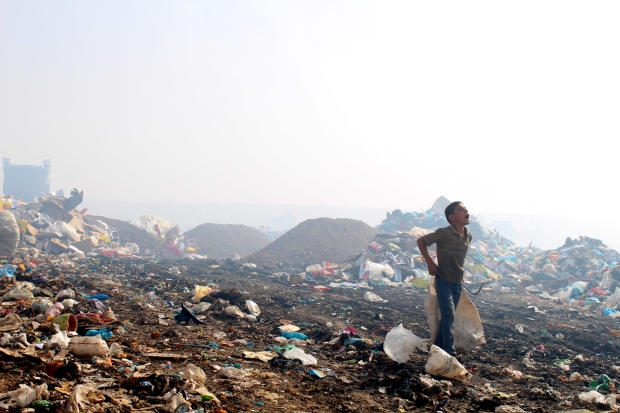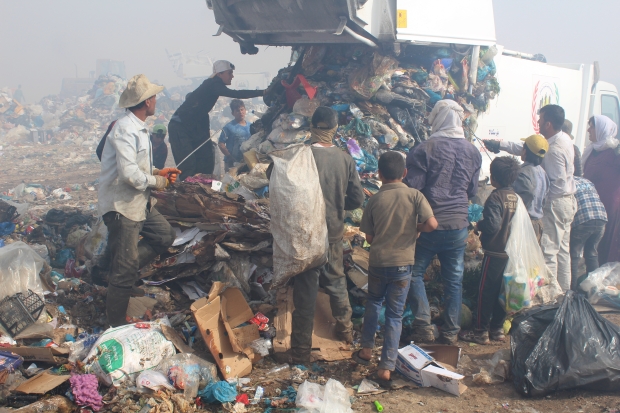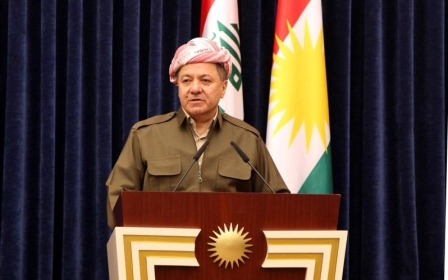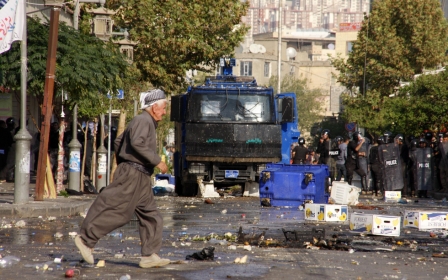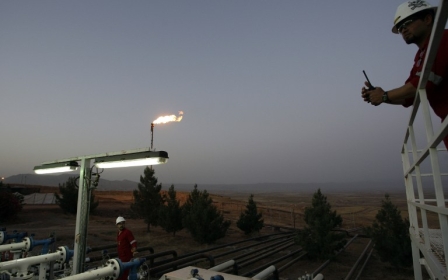Down in the dumps: Erbil's landfill people sift waste to scrape a living
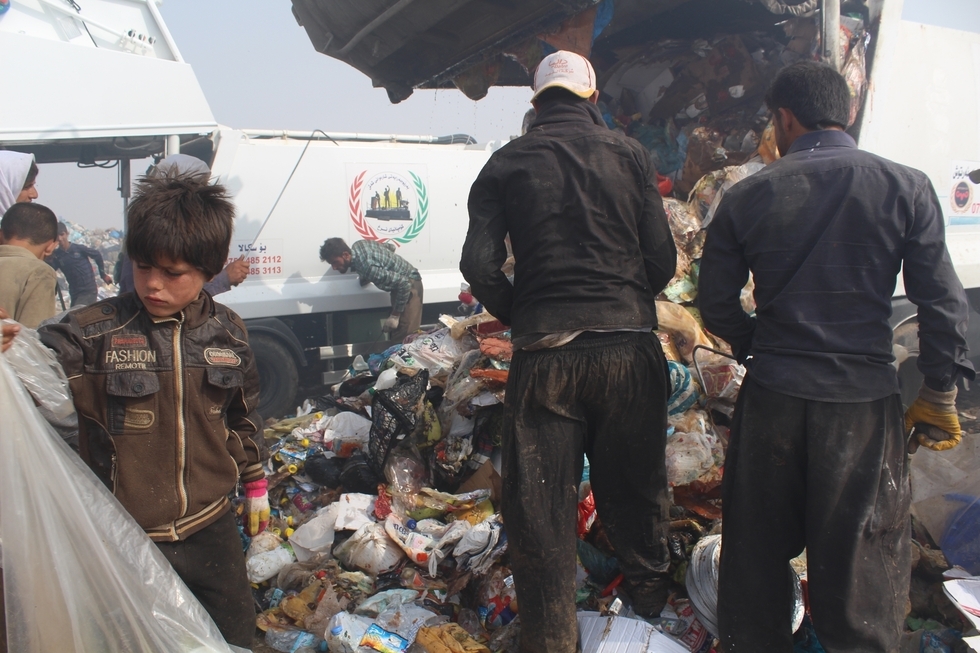
ERBIL, Iraq - On a bright morning in June, a thick layer of choking, acrid smoke obscures the figures moving wearily among the piles of waste at the edge of a huge landfill.
A strong breeze fans the smoke from fires that have been lit to burn away flammable material, making it easier to collect scrap metal after the flames have died down.
Scavengers - men, women and children - wade through dumpsters, collecting other people's waste to make a few dollars from the resale.
These are the landfill people of Erbil, the capital of Iraq's autonomous Kurdish region which had until recently grown wealthy on oil sales and relative stability.
Now, thanks to an influx of more than a million refugees from the country's war with the Islamic State, and a worldwide oil price crisis, legions are sifting through the rubbish to make ends meet.
"Before Ramadan, it was like a car show here," says 19-year-old Farhan - hundreds would park their cars and pick-up trucks next to the slope leading to the fires to hunt for anything of value.
"Every day the amount of people increases," says Omar, who buys plastic from the rubbish collectors for a small recycling plant he operates nearby.
The site at Kani Qirzala, a short drive from Erbil, has been a source of income for a handful of people since its inception. But when IS stormed into Iraq in 2014, it displaced millions of Iraqis, of whom about 1.3 million ended up in the Kurdish region.
Many are destitute, and refugees from nearby camps now come to Kani Qirzala to scrape a living.
But local Kurds are also flocking to the landfill in increasing numbers. The war has added to the strain on the economy in the autonomous region, which has been affected by a drop in the oil price and a long-running dispute with the central government in Baghdad over budget allocations.
Government salaries have been halved and are in arrears, a disaster for a workforce that is overwhelmingly employed by the state. With so many displaced Iraqis in the region, menial jobs pay less than ever. Because the Kurdish government neglected to diversify the economy, there are few alternatives to the public sector.
One alternative for struggling families is Kani Qirzala. Ibrahim, not even yet a teenager, has been coming here for almost a year with his parents and brother after his father left the Peshmerga, the Kurdish armed forces, when salaries were not paid.
"We have debts to pay because of the lack of income," he shrugs when asked why he works at the landfill.
Ibrahim insists he still goes to school, but today he is picking plastic bottles and other receptacles from piles of rubbish as soon as they are dumped on the ground by waste trucks. It is tough work in filthy conditions, and it is leaving a mark on the young boy.
"When I get home I feel numb, I have no energy left," he says.
Health hazards
Most of the scavengers are under-age boys, and the landfill is affecting their health. The smoke is so dense that visibility is at times restricted to just a few metres, and its particles coat eyes, skin and lungs alike.
The ground is covered in grime, sometimes filthy water sprays from the trucks as they unload. Poisonous substances are dumped at the site and spread amongst the muck.
Common ailments are headaches, nausea, vomiting and breathing problems, which can develop into asthma over time. The discomfort is not restricted to working hours.
"At night I can't sleep because my eyes ache. I can't even watch TV," complains Ihram, who at 33 easily looks 10 years older than her age.
She has been picking rubbish with her three sons at the tip for the past six months after her husband's disability benefits were halved to $150 a month, and are now several months in arrears.
Her boys - aged seven, nine and 11 - have had to quit school and work in order to help make ends meet.
"It's bad that they left school, but if they didn't work we wouldn't have an income," says Ihram. Even this sacrifice does not always pay off. The family has not been paid for the plastic they collected in the past three days.
The children who are new to the dump look bewildered, and stagger helplessly about in the haze.
Monsters in the smog
The more experienced ones wear gloves and cover their mouths with masks, while they robotically go about their work, piercing rubbish with short metal pikes and depositing it in big plastic bags.
"These two bulldozers don't take any care where they are going. I'm afraid of them," says Ibrahim as he walks by, waving his finger at two hulking machines pushing rubbish down the slope of the tip. Even though they are close, they are barely visible in the dense smog.
Mam Kheder, a 63-year-old farmer in traditional Kurdish garb with a chequered scarf wrapped around his head, revealing only his eyes, says he only comes to the site on occasion to look for discarded items that can still be used. He is exasperated at the sight of a group of children at the dump.
"Those who work efficiently earn a lot of money here, but these little ones just run around and try not to get hit by the vehicles," he says.
Ibrahim estimates that he can earn up to 15,000 Iraqi dinar, about $12, a day. On a good day, Ihram and her boys can collect 160kg of plastic, earning them 30,000 dinar. But with the economic crisis showing few signs of abating, the crowd at the landfill has kept growing, diminishing returns.
"Making money here is more difficult now for two reasons. There are more people here now, and because of the crisis households throw away less things that have value," says Dilbar, a former Peshmerga fighter who has been collecting rubbish for the past three years. Despite the dwindling returns, Dilbar says the landfill is still more profitable than rejoining the Peshmerga.
The scavenging at the dump could soon come to an end, however. The municipality will appoint a contractor to run the landfill on 1 July, according to Haydar Maloud, the site manager.
The contractor will be fined for fires at the site, and will handle the waste management. The new company will likely clamp down on the chaotic free for all by limiting access to its own employees.
When that happens, the apocalyptic scenes at Kani Qirzala will come to an end, and the desperate waste pickers will have to find another way to steal a living.
New MEE newsletter: Jerusalem Dispatch
Sign up to get the latest insights and analysis on Israel-Palestine, alongside Turkey Unpacked and other MEE newsletters
Middle East Eye delivers independent and unrivalled coverage and analysis of the Middle East, North Africa and beyond. To learn more about republishing this content and the associated fees, please fill out this form. More about MEE can be found here.


